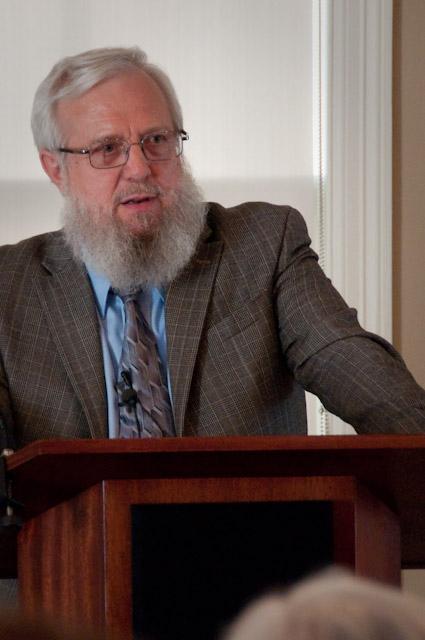
SMU Theology professor Dr. William Abraham discussed the relationship between terrorism and theology at a lecture on Thursday. (Sidney Hollingsworth/The Daily Campus)
Even ten years after 9/11, people across the country still have questions.
What is terrorism, really? Why does it occur? How can such inherently evil acts such as the one that occurred on 9/11 possibly have anything to do with theology?
Dr. William Abraham, a professor of theology, tackled some of these questions from a philosophical and theological perspective Thursday in his lecture, “Haunted Memories and Complex Loyalties.”
“The truth is clear: the highest act of evil was done on 9/11,” he said. “In my bones I knew that our culture had changed dramatically.”
The impacts of terrorism on a country are almost never-ending. Systems have to be put in place for dealing with perpetrators in our country, precautions have to be taken to anticipate and prevent further attacks, citizens have to trust that their leaders will appropriately handle the issue and politicians have to factor terrorism into every decision they make.
In regards to 9/11, “we say that no truly religious person could ever do this sort of thing,” said Abraham.
He added, this kind of evil act cannot be understood without examining potential theological motives.
For a few chilling minutes, Abraham reviewed the training, indoctrination, and religious rituals that the terrorist agents in the Sept. 11 attacks went through prior to taking thousands of innocent lives.
Prayer was involved in every step.
The attackers prayed for victory and for the forgiveness of their sins, which Abraham noted most likely included their attendance at strip clubs.
They coated themselves in perfume and prepared themselves for death and their subsequent arrival in “paradise.”
They pored over excerpts of the Quran, spending extra time on the one that said that, if God willed it to be so, small groups could sometimes overtake larger groups. They sharpened their knives, planned each detail, and prayed again that security would overlook their weaponry.
These details, Abraham said, are not speculation.
Instead, they were taken from the diaries of the agents who executed the attacks.
Because what happened on 9/11 ten years ago cannot be put into context without discussion about theology, Abraham said that post 9/11, “we also cannot understand ourselves in this ‘new normal’ without theology.”
In closing, Abraham chose to use the words of the Eastern Orthodox Church to commemorate the lives lost that day: “May the memory of those who died be eternal.”










